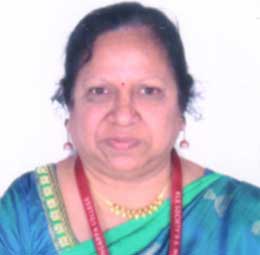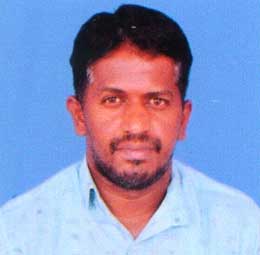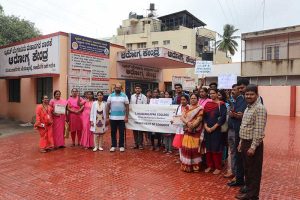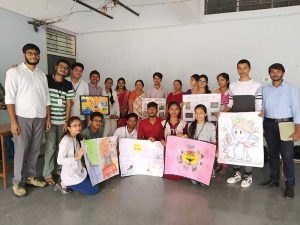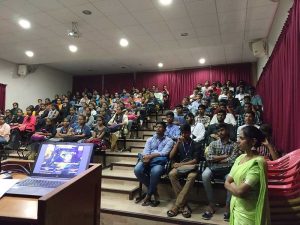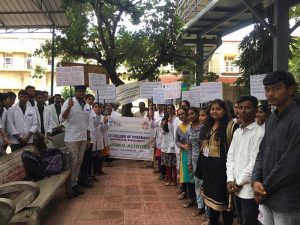Zoology
- OVER VIEW
- PROGRAMMES
- CURRICULUM
- INFRASTRUCTURE
- FACULTY PROFILE
- STUDENTS PROFILE
- POs, Cos and PSOs
- CALENDAR OF ACADEMIC EVENTS
- ACADEMIC EVENTS
- RESEARCH
-
CO-CURRICULAR AND
EXTRACURRICULAR ACTIVITIES -
EXTENSION ACTIVITIES AND
OUTREACH PROGRAMMES - BEST PRACTICES
-
SOP MANUAL:
STANDARD OPERATING PROCEDURE - GALLERY
- PLACEMENTS
- PROMINENT ALUMNI
- EMINENT PERSONALITIES VISITED
- QUESTION BANK
- LMS
Overview of Department:
Department of Zoology was established in the year 1967 for Under Graduate course – Bachelor of Science (B.Sc) with an aim to provide quality education and to contribute the knowledge of animal sciences and zoological studies to students.
The semester system was implemented since 2014, currently offering CBZ and CZBt programs on semester scheme, 2018-19 batch onwards Bengaluru Central University.
Department has Museum, Library, two well equipped laboratories and one research lab. Highlight of the department is the State of art Museum which consists of many rare bottle specimens, stuffed specimens, number of skeletons, charts, models, coral island, fossils and well maintained aquarium and perfectly illuminated exhibits, acquired during the past five decades. The Zoology Museum has been a prestige for the whole College. Many eminent personalities visiting our museum. We are seeking their suggestions to maintain and develop museum.
The department possesses a rich Library with about 384 subject related well displayed books, Audio-visual CDs and journals.
The Departmental laboratories include-a wet laboratory having equipments such as Digital Weighing Balance, pH Meter, Compound Microscopes, Trinocular Microscope, Water Bath, Distillation Plant, Electrophoresis Unit, Power Pack, Mictrotome, Shaker, Centrifuge, Hot Air Oven, and CO2 Incubator, Digiscopeetc. One lab is equipped with LCD. Students are regularly doing some small research projects.
Fauna zoological club was established in the year 2003. Zootopia Club was established in the year 2019 to create awareness about environmental conservation, to develop research activities and to create a social awareness about current scenarios. Department regularly organizes educational trips to wild life sanctuaries, National parks and field trips to study economic zoology, Science fest, Interactive workshops, State level, National level Seminars, Conferences, Workshops, competition for students in view of important days of Science etc.
A graduate degree in Zoology opens a vast range of career opportunities in the field such as Teaching and Research, Forensics, Indian Forest Services, Indian Administrative Services, including working as zoo curators, museum curators, animal and wildlife educators, wildlife rehabilitators and conservationists, Research Project assistants and in higher specialized studies. The career opportunities for a post graduate in Zoology are limitless. Some of the employment areas which provide huge openings for the M.Sc. Zoology candidates are medical laboratories, wildlife rehabilitation centers, hatcheries, agricultural departments, museum services, conservation agencies, scientific civil services, environment or ecosystem management sector, environmental consulting firms, and so on. In addition, there are numerous opportunities in the field of research in India and abroad.
The performances of the students are assessed by the Group tutors and proper guidance is given in accordance with the inputs from their parents. The tutorial system and PTS act as grievance redressal mechanism also. In remedial teaching, the Group tutor identifies the weaker students in a class and special coaching classes are given to them.
The department organizes regular seminar for microteaching-interaction with honours Students. The students generally speak on syllabus related topics within a given duration followed by questionnaire.
Extension Activity – Our students engage themselves in conducting awareness programmes for the general public, setting an example how to use their knowledge for the community.
During the last ten years, two major projects funded by UGC and by VGST and a UGC minor project have been successful completed.
OBJECTIVES OF ZOOLOGY DEPARTMENT
- To familiarise the students with animal diversity and conservation.
- To provide value based, need based and career oriented education to meet the global challenges.
- To impart knowledge about human anatomy & importance of health & hygiene.
- To create awareness on pollution & protection of biodiversity.
- To train students to acquire the skills to take up competitive exams/ peruse higher studies.
- To develop a scientific temper & inquisitiveness for research.
- Holistic development of students to get better placement and self-employment.
MILESTONES
- Department of Zoology was established in 1967.
- Affiliated to Bangalore University in the year 1967 & permanently affiliated to Bengaluru City University in the year 2022.
- Introduction of new programme CZBT in 2005.
- Establishment of vermicompost bin in the year 2019.
- Department upgraded the state of the art museum & departmental library in the year 2004.
- Up gradation of labs under CPE Phase I & II in the respective years 2015-16.
- Commencement of Self-financed Certificate in the year 2019 & Value-added course in the year 2022.
- Introduction of the UGC-STRIDE Certificate courses & Research project in the year 2020-2021.
DISTINCTIVENESS
- Centre of attraction “State of art Museum” comprising of rare preserved & Stuffed specimens, Sections of human organs, cancerous organs, corals, foetuses, Skeletons of various animals including human, Aquarium, Products of economic zoology & fifty million year old Fossils
- Department is maintaining vermicompost bin to yield large scale vermicompost & Vermiwash by using our own college garden waste. We are using compost for our college garden & excess selling for students, teachers & community.
- Department has association named “Zootopia” and “Youth Red Cross”.
- Department offers short term courses like Certificate course &Value added course.
- Two spacious well-equipped laboratories and one with ICT enabled facilities.
- Department has association with well equipped Dr. Prabhakar B Kore, Basic Research Centre.
- Organizing field visits and apiculture training program as experiential learning.
- Well experienced and dedicated faculty members.
VISION
To bring out the best in man by providing value based, need based and carrier-oriented education and create self-reliant global citizens.
MISSION
To generate knowledge and produce researchers, leaders and graduates in the field of plant sciences capable of providing solutions to industrial, health and environmental challenges.
Programmes Offered:
- Bachelor of Science (B. Sc) in Zoology and Chemistry.
- Bachelor of Science (B. Sc) in Zoology and Botany.
- Bachelor of Science (B. Sc) in Zoology and Biotechnology.
Certificate courses Offered:
- Vermiculture and Vermicomposting.
- UGC STRIDE certificate course-“Analytical techniques and Bioinstrumentation”.
- UGC STRIDE certificate course-“Analytical techniques in Clinical Microbiology”.
Value added Course Offered:
- “Analytical techniques in Biology”
Eligibility:
The candidates must have passed II PUC or equivalent stream from a recognized board with Biology as one of the core subject.
| Sl. No | Facilities | Numbers |
| 01 | Laboratories (01 ICT enabled lab) | 02 |
| 02 | State of art Museum (No. of Specimens: 220) | 01 |
| 03 | Dr. Prabhakar B. Kore Basic Science Research Centre | 01 |
| 04 | Department Library (395 Books, journals, CD’s) | 01 |
| 05 | Staff room | 01 |
| 06 | Models | 08 |
| 07 | Charts | 80 |
| Course | Class | Intake | 2017-18 | 2018-19 | 2019-20 | 2020-21 | 2021-22 | 2022-23 |
| CBZ | I CBZ | 72 | 72 | 72 | 72 | 58 | 79 (DSC) | 19(DSC) |
| CZBt | I CZBt | 60 | 59 | 60 | 60 | 52 | 48 (OE) | 69(OE) |
| CBZ | II CBZ | 72 | 37 | 66 | 64 | 72 | 53 | 68(DSC) |
| CZBt | II CZBt | 60 | 55 | 57 | 58 | 60 | 48 | – |
| CBZ | III CBZ | 72 | 32 | 35 | 65 | 64 | 56 | 48 |
| CZBt | III CZBt | 60 | 18 | 55 | 55 | 58 | 53 | 47 |
| Grand Total | 396 | 273 | 345 | 374 | 364 | 337 | 251 |
| Year | Total Appeared | Pass% |
| 2018-19 | 169 | 94.45 |
| 2019-20 | 119 | 95.92 |
| 2020-21 | 121 | 97.10 |
| 2021-22 | 112 | 95.53 |
Program Outcomes:
- Students gain knowledge and skill in the fundamentals of animal sciences, understands the complex interactions among various living organisms
- Analyse complex interactions among the various animals of different phyla, their distribution and their relationship with the environment
- Apply the knowledge of internal structure of cell, its functions in control of various metabolic functions of
- Understands the complex evolutionary processes and behaviour of animals
- Correlates the physiological processes of animals and relationship of organ systems
- Understanding of environmental conservation processes and its importance, pollution control and biodiversity and protection of endangered species
- Gain knowledge of Agro based Small Scale industries like sericulture, fish farming, butterfly farming and vermicompost
- Understands about various concepts of genetics and its importance in human health
- Apply ethical principles and commit to professional ethics and responsibilities in delivering his duties
- Apply the knowledge and understanding of Zoology to one’s own life and work
- Develops empathy and love towards the animals
v Course Outcomes:
Animal Diversity – Invertebrates
- Describe general taxonomic rules on animal classification
- Classify Protista up to phylum using examples from parasitic adaptation
- Classify Phylum Porifera to Echinodermata with taxonomic keys
- Describe Phylum Nematoda and give examples of pathogenic Nematodes
Ecology, Zoogeography and Animal Behaviour:
- Distribution of fauna in different realms interaction
- Understand Animal behaviour and response of animals to different instincts
- Interaction of biota abiota
- Various kinds of Animal adaptations
Animal Diversity – Vertebrates & Developmental Biology:
- Imparts conceptual knowledge of vertebrates, their adaptations and associations in relation to their environment
- Classify phylum Protochordates to Mammalia
- Complex Vertebrate interactions
- Basic concepts of developmental biology
Cell Biology, Genetics and Evolution:
- Structural and functional aspects of basic unit of life i.e. cell concepts
- Mendelian and non mendielian inheritance
- Concept behind genetic disorder, gene mutations- various causes associated with inborn errors of metabolism
- Theories of Evolution
- Knowledge of eras and evolution of species
Physiology and Biochemistry:
- Seeks to understand the mechanisms that work to keep the human body alive and functioning
- Physiological and biochemical understanding through scientific enquiry into the nature of mechanical, physical, and biochemical functions of humans, their organs, and the cells of which they are composed
- Interactions and interdependence of physiological and biochemical processe
Animal Physiology:
- Students are taught the detailed concepts of digestion respiration excretion the functioning of nerves and muscles
- Students gain fundamental knowledge of animal physiology
- Students will gain skill to execute the roles of a biology teacher or medical lab technicians with training as they have basic fundamentals
Animal physiology genetics and evolution:
- Students learn the concepts of endocrine systems and homeostasis a brief account of genetics and organic evolution.
- This course helps students to gain fundamental knowledge in these topics
- Students gain fundamental knowledge of physiology and endocrine systems
- Students gain fundamental knowledge ofphysiology of homeostasis
- Understanding of basic concepts of genetics, laws of inheritance and central dogma of biology
- Understanding of genetic basis of evolution, human karyotyping and speciation
Applied Zoology:
- Understands concepts of fisheries, fishing tools and site selection
- Aqua culture systems, induced breeding techniques, post harvesting tecniques
- Understands about composition of blood, blood born diseases, autopsy and biopsy
- Types of immunity, antigens-antibodies and their properties
Entomology:
- Imparts knowledge of beneficial and non-beneficial insects
- Knowledge of how they interact with their environment, other species and humans
- Classification of Insects
- Role of insects in spread of diseases
Sericulture:
- Gives knowledge of silk worm rearing
- Mulberry cultivation
- Pests and diseases associated with silk worm and mulberry
- Various process involved in silk production
Research Methodology:
- Understanding of scientific method, concepts and steps in research
- Differentiate between the Quantitative and Qualitative Research and understand different types of Research Design
- Understand the various techniques of Data Collection- Observation, Questionnaire, Interview Schedule; Case Study, Social Survey, Content Analysis
- Describing various types of Sampling
- Elaborate on Data Processing and Data Analysis
Immunology:
- Imparts in depth knowledge of tissues, cells and molecules involved in host defense mechanisms
- Understanding of types of immunity
- Interactions of antigens, antibodies, complements and other immune components
- Understanding of immune mechanisms in disease control, vaccination, process of immune interactions
Clinical science:
- Gives knowledge related to the techniques involved in detection of various diseases
- Pathology associated with various diseases
- Practical skills of conducting basic clinical lab experiments
- Application of knowledge of clinical science and pathology to one’s own life
Animal biotechnology:
- Imparts the Knowledge to culture animal cells in artificial
- Knowledge of animal cells in culture, growth of cell lines
- Use in recombinant DNA technology, genetic manipulations and in a variety of industrial
Aquarium fish management:
- Provides knowledge of ornamental fish breeding which is highly professional and attractive avenue for youth
Clinical Science and pathology:
- Understands about composition of blood, blood born diseases, autopsy and biopsy
- Techniques of microscopy, microtomy, biopsy, autopsy and immunological techniques
- Types of immunity, antigens-antibodies and their properties
- Understanding of pathology of diseases caused by various microorganisms such as bacteria, virus, parasites and fungus
Structural Biology [SB]:
- Allows the students to gain basic knowledge about various bio molecules and their role in metabolism
- Classification of enzymes, enzyme kinetics
- Metabolism of carbohydrates, nucleic acids and metabolic disorders
- Gains understanding of cellular organization and functional biology nucleic acids
Environmental and Conservation Biology [ECB]:
- Imparts knowledge to the student regarding environment and conservation biology.
- Gains knowledge in the areas of responses to Laws of limiting factor, Laws of minimum, Laws of Tolerance and Tragedy of commons
- Types of ecosystem – freshwater, marine and terrestrial,
- Population characteristics and dynamics – conceptual approach
- Growth curves and pyramids; sigmoid curve, J curve and hyperbola; logistic equation and concepts relating to growth
- The students will be well equipped to become very competent in research or teaching fields after completion of this course
Immunology [IMM]:
- Provides basics knowledge about immune system and allows the student to create insight as how to improve their immune system and good health.
- Types of immunity, antigens-antibodies and their roperties
- Complement system, MHC’s and immune responses
- Understanding of types of hypersensitivity reactions and auto immune diseases
- Ability to understand concepts of tumor immunology and transplantation immunology
Taxonomy, Systematics and Functional Anatomy of Invertebrates [TSFAI]:
CO1 Imparts knowledge regarding the various Invertebrates species and the regulatory processes to safeguard them
CO2 With the study of this paper students gain knowledge in the areas of responses to Systematic position, general organization and affinities of Ctenophora and Nemertea
CO3 Rhynchoceola; Systematic position, general organization and affinities of Rotifera
CO4 Systematic position, general organization and affinities of Hemichordata
CO5 The students will be well equipped to become very competent in research or teaching fields after completion of this course
Tools, Techniques and Biostatistics [TTB]:
CO1 Students gain knowledge about various tools & techniques used in biological systems and givesthem insight about their use in research.
CO2 Biostatistics teaches them to use the best data analysis methods in their research projects
CO3 Students gains knowledge about statistical methods like measures of central tendencies, Probability
CO4 Learns about hypothesis testing and inferential statistics CO5 Learns the problem-solving methods
Animal Physiology [AP]:
CO1 Imparts knowledge about various metabolic and physiological mechanisms of the human body. CO2 Understands about neurophysiology and receptors
CO3 Gain knowledge about hormones and bioluminescence
CO2 Understanding of stress physiology and endocrine mechanisms will allow them to control their stress and emotions there by diverting their energy towards the positive nation building activities
Molecular Genetics and Developmental Biology [MGDB]
CO1 Knowledge about genetics, developmental biology and organogenesis CO2 Application of DNA technology and molecular biology for research
CO3 Gains knowledge about gametogenesis, cleavage mechanisms, gastrulation and role of hormones in metamorphosis and regeneration
CO4 provides students insight into maintaining healthy relationships with their opposite gender and allows them to make right choice about their life partner thus preventing congenital/consanguial diseases.
Evolution and Functional Anatomy of Vertebrates [EFAV]
CO1 Imparts knowledge regarding the various theories of evolution, evolutionary process such as variation, speciation, natural selection, origin of primates and man
CO2 Understanding of origin and salient features of Ostracoderms to Actinopterygii, adaptive radiation of Amphibians, Reptiles, birds and Mammals
CO3 Gains knowledge of functional anatomy of vertebrates from fishes to mammals
CO4 Understanding of evolutionary significance of internal fertilization, neoteny and paedogenesis.
v Program Specific Outcomes:
- Understand the nature and basic concepts of cell biology, genetics, taxonomy, physiology, ecology and applied Zoology
- Analyze the relationships among animals, plants and microbes
- Perform procedures as per laboratory standards in the areas of Taxonomy, Physiology, Ecology, Cell biology, Genetics, Applied Zoology, Clinical science, tools and techniques of Zoology, Toxicology, Entomology,Nematology Sericulture, Biochemistry, Fish biology, Animal biotechnology, Immunology and research methodology
- Understand the applications of biological sciences in Apiculture, Aquaculture, Agriculture and Medicine
- Gains knowledge about research methodologies, effective communication and skills of problem solving methods
- Contributes the knowledge for Nation
CALENDER OF EVENTS – ODD SEMESTER 2020 – 21
| Sl. No | DATE | PARTICULARS | DEPARTMENT |
| 1 | 05/06/2020 | Quiz Competition in view of World Environmental Day | Zoology |
| 2 | 20/06/2020
| Interactive webinar on sickle cell diseases | Zoology |
| 3 | 28/07/2020 to 31/07/2020 | E-Quiz on “Hepatitis” | Zoology |
| 4 | 29/07/2020 to 01/08/220 | E-Quiz on “Tiger” | Zoology |
| 5 | 14/10/2020 | Interactive Webinar Topic: Bird Migration Research: Techniques And Tools | Zoology |
| 6 | 29/10/2020 | NATIONAL e-CONFERENCE Topic: Pollution And Its Impact On Universal Health | Zoology |
EVEN SEMESTER 2020 – 21
| Sl. No | DATE | PARTICULARS | DEPARTMENT |
| 01/12/2020 | Essay Writing Competition | Zoology | |
| 1 | 04/02/2021 | Guest lecture on LUMP TO LAUGHTER- The Big C – It’s time to talk | Zoology |
| 2 | 27/05/2021 | INTERNATIONAL WEBINAR Topic: Nurturing Biodiversity; An Imperative Commitment to Mankind | Zoology |
| 3 | 21/05/2021 | Student e-Poster competition
| Zoology |
| 4 | 31/05/2021 | Student essay competition
| Zoology |
CALENDER OF EVENTS – ODD SEMESTER 2021 – 22
| Sl. No | DATE | PARTICULARS | DEPARTMENT |
| 1 | 29/09/2021 | Interactive workshop entitled “Myths on Covid 19 Heart attack” | Zoology |
| 2 | 27/10/2021
| Interactive workshop on “Life Changing Careers through Life Science”. | Zoology |
EVEN SEMESTER 2021 – 22
| Sl. No | DATE | PARTICULARS | DEPARTMENT |
| 1 | 08.03.2022 | Extension Activity- Health check up camp | Zoology |
| 2 | 12/04/22 | Experiential learning – Bio-center, Govt. Of Karnataka, Hulimavu | Zoology |
| 3 | 02/05/2022 | Open day | Zoology |
| 4 | 31/05/ 2022 | Extension Activity– Awareness program & rally | Zoology |
CALENDAR OF EVENTS – ODD SEMESTER 2022 – 23
| Sl. No | DATE | PARTICULARS | DEPARTMENT |
| 1 | 29/06/2022 | Skit “Parivarthane” in view of world drug abuse day | Zoology |
| 2 | 23/08/2022 | Experiential learning (Field trip) | Zoology |
| 3 | 20/11/2022 |
Walkathon on World Diabetes Day-2022
| Zoology |
| 4 | 24/12/2022 | Mid night walkathon | Zoology |
| 5 | 27/12/2022 | Educational trip | Zoology |
EVEN SEMESTER 2022 – 23
| Sl. No | DATE | PARTICULARS | DEPARTMENT |
| 1 | 10/02/2023 | Awareness Campaign on De-worming | Zoology |
| 2 | 13/02/2023 | Essay Competition | Zoology |
| 3 | 24/02/2023 | National Conference on “ Evolutionary Biology and Infectious Diseases | Zoology |
| 4 | 22/05/2023 | Interactive workshop on Biodiversity day | Zoology |
CALENDAR OF EVENTS – ODD SEMESTER 2023 – 24
| Sl. No | DATE | PARTICULARS | DEPARTMENT |
| 1 | 15/07/2023 | Science Exhibition – Extension activity | Zoology |
| 2 | 11/08/2023 | Competitive exams in Life Science | Zoology |
| 3 | 21/11/2023 | Interactive Workshop on Premenstrual Syndrome” | Zoology |
| 4 | 24/11/2023 | Essay writing competition on Diabetes | Zoology |
| 5 | 01/12/2023 | Awareness program in view of World AIDS Day – Extension activity | Zoology |
2022 – 2023
- arocha 23.8.22
- conference 24.2.23
- interactive workshop 22.5.23
- science exhibition 15.7.23
- trip nagarhole 27.12.22
2021 – 2022
2020 – 2021
- bird migration 14.10.20
- interactive webinar 30.5.20
- pollution and impact 29.10.20
- world aids day 1.12.20
- world anti tobacco 31.5.21
- world cancer day 4.2.21
2019 – 2020
- Debate and collage
- Interactive work shop
- Poster presentation
- Asha autism
- E-quiz
- Extension Act
- Health checkup
- Interactive workshop
- Meditation
- Swachhata pakawada
2018 – 2019
- UGC-STRIDE Minor Research Project: Safety aspects of
drinking water in Bengaluru city. 22/09/2021. - Effect of Yttrium salts on Behaviour & Reproduction in
Drosophila.

